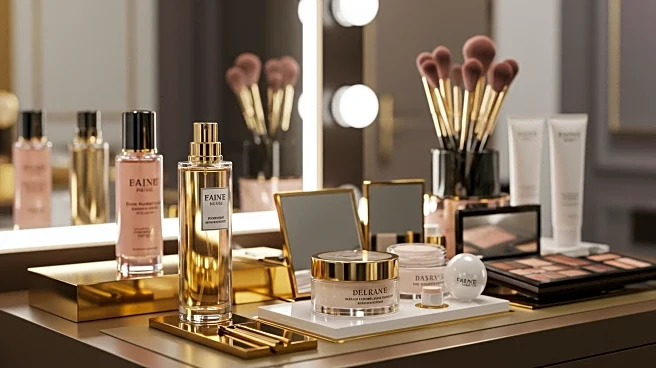What's Happening?
John Lewis is launching a new strategy to transform its Beauty Halls into immersive, multi-sensory destinations, following a 40% sales growth in its beauty category over the past five years. The UK department store chain is investing millions to revamp its Beauty Halls, starting with its Liverpool store, which has been expanded by 40% to 16,000 square feet. This store now features 132 premium brands, including a new partnership with Rihanna's Fenty Beauty. The revamped halls aim to move away from traditional counter-based models to sensory spaces where customers can experience products through treatments and consultations. The Liverpool store serves as a blueprint for national expansion, with similar transformations planned for John Lewis stores in Cambridge and Bluewater in Solihull by the end of 2025.
Why It's Important?
This strategic move by John Lewis highlights the growing importance of experiential retail in the beauty industry. By investing in immersive shopping experiences, John Lewis aims to enhance customer engagement and differentiate itself in a competitive market. The expansion of premium brand offerings and sensory spaces is likely to attract a broader customer base, potentially increasing sales and brand loyalty. This development reflects a broader trend in the retail sector, where physical stores are evolving to offer unique experiences that cannot be replicated online, thus reinforcing their role as vital components of brand identity and customer interaction.
What's Next?
John Lewis plans to continue its Beauty Hall transformations across other locations, with Cambridge and Bluewater stores set for similar upgrades by the end of 2025. As these changes roll out, the company may see increased foot traffic and sales, prompting further investments in experiential retail. Competitors in the beauty retail space, such as Boots and Sephora, are also expanding their physical presence, indicating a potential shift in the industry towards more interactive and engaging shopping environments. The success of these initiatives could influence other retailers to adopt similar strategies, reshaping the landscape of beauty retail.
Beyond the Headlines
The transformation of John Lewis Beauty Halls could have broader implications for the retail industry, particularly in terms of how physical stores are perceived and utilized. As digital shopping continues to grow, physical stores must offer unique experiences to remain relevant. This shift towards experiential retail may lead to changes in store design, staffing, and marketing strategies, emphasizing customer interaction and brand storytelling. Additionally, the focus on premium brands and exclusive partnerships may drive innovation and collaboration within the beauty sector, potentially leading to new product offerings and marketing approaches.











